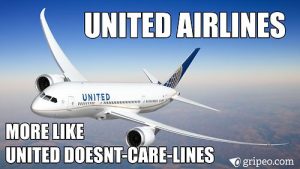 Unless you spent the week off the grid, I’m sure you’ve heard that United airlines forcibly dragged a ticketed, paid, seated passenger from a flight in order to make room for four of its employees. This was after passengers declined to give up their seats in exchange for $800 flight vouchers. The incident has sparked plenty of discussion about how airlines should treat passengers when they’re bumping them from seats they’ve already paid for. At first blush, it’s surprising that United didn’t resort to a simple capitalist solution, like offering a handsomer bounty for disembarking. Pull back the layers, though, and you find that the airline industry doesn’t really play by the rules of the free market. What problems arise from the oligopoly structure of the airline industry, and are there any viable alternatives? I’ll take a crack at the first question, and next week my law parter George will tackle the second.
Unless you spent the week off the grid, I’m sure you’ve heard that United airlines forcibly dragged a ticketed, paid, seated passenger from a flight in order to make room for four of its employees. This was after passengers declined to give up their seats in exchange for $800 flight vouchers. The incident has sparked plenty of discussion about how airlines should treat passengers when they’re bumping them from seats they’ve already paid for. At first blush, it’s surprising that United didn’t resort to a simple capitalist solution, like offering a handsomer bounty for disembarking. Pull back the layers, though, and you find that the airline industry doesn’t really play by the rules of the free market. What problems arise from the oligopoly structure of the airline industry, and are there any viable alternatives? I’ll take a crack at the first question, and next week my law parter George will tackle the second.
Too much power
Despite antitrust efforts on the part of the DOJ, the U.S. airline market has come to be controlled by four major airlines (Delta, Southwest, American, and United). It doesn’t take an Econ degree to realize why that’s bad for consumers. In a true free market, buyers can leverage their purchasing power to influence the behavior of sellers. This doesn’t work so well in an oligopoly like the airline industry, where a consumer has essentially two choices: fly on a major airline on their terms, or don’t fly at all. Little consumer choice means a big disparity of power between passengers and airline carriers. Simply put, oligopolists do what they want, and they don’t care much what we think about it because they don’t have to.
Not enough accountability
Compared to all the power they have, the airline oligopolists have very little accountability. Sure, United took a little hit to its stock after the world saw its employees drag a customer down the aisle like a piece of luggage. Do we expect that trend to last, though? After all, this certainly isn’t the first PR nightmare the company has seen in the past year or two. The reality is that oligopolies are much more insulated from the court of public opinion than players in a true competitive marketplace.
It’s been said in response to this incident that there’s no Constitutional right to fly on an airplane. Fair enough. But the right to travel is embodied in the Constitution, and so is the importance of interstate commerce. In modern times, air travel has become an integral part of how we move both goods and people. So, when our system of government allows for so much power in this industry to be concentrated in the hands of so few, shouldn’t the law hold those with the power be accountable? Better yet, could we scrap the oligopolists altogether and embrace an alternative?
More on that next week. Until then, relax and enjoy your fill of United Airlines memes.




